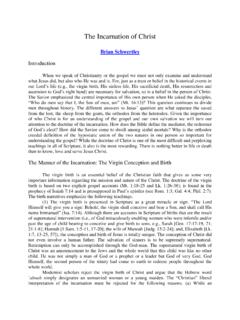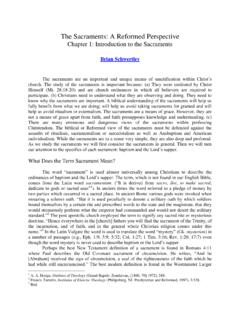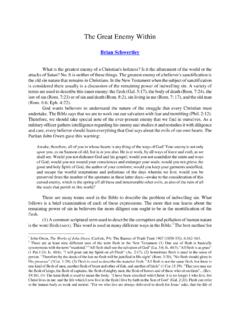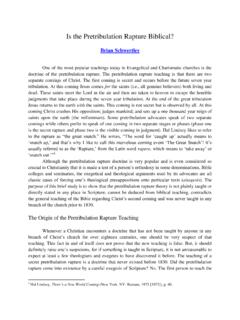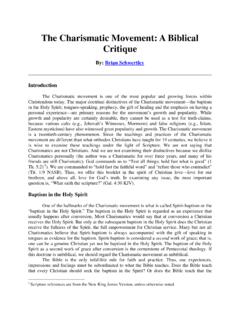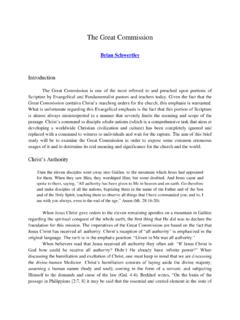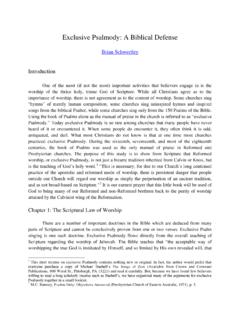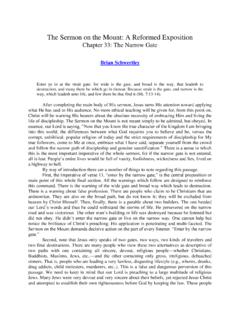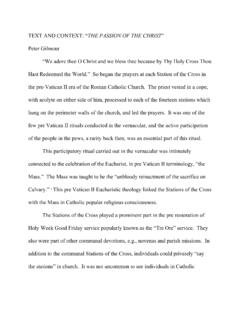Transcription of The Passion of the Christ - Reformed Online
1 The Passion of the Christ : A Biblical Critique of the Mel Gibson Film Brian Schwertley A movie produced and directed by Mel Gibson was released recently about the last twelve hours of Jesus life entitled The Passion of the Christ . This film received a huge amount of publicity before its release in late February 2004. The negative publicity has come primarily from various Jewish groups that are concerned with anti-Semitism. However, the movie received much praise and adulation from Roman Catholics, Evangelicals, conservative radio talk show hosts and even a few Jewish rabbis. A number of Romanists and Evangelicals have even spoken of the movie as a great tool of evangelism, revival and moral societal change. Given the hoopla surrounding the release of this film, Bible-believing Christians need to ask some important questions regarding the movie s content, its use as a tool of evangelism and the buzz surrounding it.
2 (1) The first question that needs to be addressed is: Is it appropriate or lawful for a person to pretend to be Jesus in a Passion play or movie ? Although this question will immediately be dismissed by most Evangelicals and even some Reformed believers ( , many of the so-called theonomists ) as absurd, it is a very important question. Plays or movies in which men pretend to be Jesus Christ are an explicit violation of the second commandment and are 1 All the Reformed confessions and catechisms speak with one voice against making visual representations of Christ . The Westminster Larger Catechism says, The sins forbidden in the second commandment are, all devising, counseling, commanding, using, and anywise approving, any religious worship not instituted by God himself; tolerating a false religion; the making any representation of God, of all or of any of the three persons, either inwardly in our mind, or outwardly in any kind of image or likeness of any creature whatsoever; all worshiping of it, or God in it or by it; the making of any representation of feigned deities, and all worship of them, or service belonging to them.
3 All superstitious devices, corrupting the worship of God, adding to it, or taking from it, whether invented and taken up of ourselves, or received by tradition from others, though under the title of antiquity, custom, devotion, good intent, or any other pretense whatsoever; simony; sacrilege; all neglect, contempt, hindering, and opposing the worship and ordinances which God hath appointed. (LC # 109) The Heidelberg Catechism declares, We are not to make an image of God in any way, nor to worship him in any other manner than he has commanded in his Word (Deut. 4:15-19; Isa. 40:18-25; Acts 17:29; Rom. 1:23; Lev. 10:1-7; Deut. 12:30; 1 Sam. 15:22-23; Matt. 15:9; John 4:23-24)..God cannot and may not be visibly portrayed in any way. Creatures may be portrayed, but God forbids us to make or have any images of them in order to worship them or to serve God through them (Ex.)
4 34:13-14, 17; Num. 33:52; 2 Kings. 18:4-5; Isaiah 40:25). (Q/A 96-97) This was also the opinion of the early church. A major church council in Constantinople (A. D. 754) decreed: If any person shall divide human nature, united to the Person of God the Word; and, having it only in the imagination of his mind, shall therefore, attempt to paint the same in an Image; let him be holden as accursed. If any person shall divide Christ , being but one, into two persons; placing on the one side the Son of God, and on the other side the son of Mary; neither doth confess the continual union that is made; and by that reason doth paint in an Image of the son of Mary, as subsisting by himself; let him be accursed. If any person shall paint in an Image the human nature, being deified by the uniting thereof to God the Word; separating the same as it were from the Godhead assumpted and deified; let him be holden as accursed.
5 Regarding this council Philip Schaff writes, The counsel, appealing to the second commandment and other scripture passages denouncing idolatry (Rom. 1:23, 25; John 4:24), and opinions of the Fathers (Epiphanius, Eusebius, Gregory Nazianzen, Chrysostom, etc.), condemned and forbade the The second commandment (read Ex. 20:4-5; Dt. 5:8-11) forbids worshiping idols, images of God and the religious use of images as aids to worship or devotion. Evangelicals will argue that a picture of Jesus or a person portraying Him in a movie or play is permissible because: (a) it is known that the person playing the Messiah is not really the Lord and (b) the portrayal is purely educational, not devotional. No one is bowing down to or worshiping the image of the Savior on the movie screen (c) Jesus was and is both God and man.
6 Therefore, his human nature can be lawfully depicted in the same manner as any other human such as George Washington or one s spouse. Although Evangelicals and backslidden Reformed Christians believe that images of Jesus are permissible there are a number of sold biblical reasons why such images are unlawful. First, Christ is unique because He is both God and man in one person. This fact means that all the divine attributes of God the Son (as well as everything relating to Jesus human nature) are attributable to the one person: the divine-human mediator. ( Reformed theologians refer to this as the communication of the attributes.) Consequently, the disciples of our Lord could lawfully worship the person of Christ . They could bow before Him in worship, wipe His feet with their tears and lean upon His breast with loving adoration.
7 Because of who our Lord is ( fully God and fully man in one person) any image or representation of Him is automatically religious or devotional in nature. A picture of Jesus or a representation of Him in a play or movie should immediately evoke thoughts of love and adoration to the Savior. If an image brings thoughts of worship and praise toward the Son of God, then obviously the image is an aid or medium to worship even if people are not bowing down to the image. Therefore, all pictures, statues or portrayals of our Lord are idolatrous. Further, anyone who pretends to be the Messiah in a play or movie is (whether he is aware of it or not) pretending to be God which is blasphemous and incredibly wicked. Second, the people who argue that pictures or representations of Jesus are lawful do so on the false assumption that the two natures of Christ can be separated.
8 Such people will often admit that the Bible strongly condemns making representations of God. But (they will argue) pictures of the Savior s human nature are permissible. But (we ask), if only the Lord s human nature is represented then are you not portraying the Messiah as infinitely less than He was, is, and ever shall be? Are you not separating the two natures of Jesus? Are you not teaching a false theology regarding God s Son? All pictures, statues, and portrayals of the Savior implicitly promote the ancient heresy of Nestorius who separated the two natures of Christ the human from the divine. Third, all pictures or portrayals of the Savior are a violation of the ninth commandment because they present a false representation of our Lord s physical appearance. If God wanted His people throughout history to have a picture or representation of His Son then He could have given us a detailed description of Jesus in public and private worship of sacred images on pain of deposition and denounced all religious representations by painter or sculptor as presumptuous, pagan and idolatrous.
9 Those who make pictures of the Savior, who is God as well as man in one inseparable person, either limit the incomprehensible Godhead to the bounds of created flesh, or confound his two natures like Eutyches, or separate them, like Nestorius, or deny his Godhead, like Arius; and those who worship such a picture are guilty of the same heresy and blasphemy. (History of the Christian Church [Grand Rapids: Eerdmans, 1987 (1910)], 4:457-458) the gospel accounts. The Bible, however, gives us almost no information at all regarding the Savior s appearance. Therefore, all pictures or portrayals of Christ are inaccurate. They are subjective, artistic, false representations of the Son of God. This fact raises an important question. Is it appropriate to make an image of the God-man based on a human fantasy?
10 2 While there is certainly nothing wrong with portraying a great figure from ancient history in a painting or movie, Christ is not like other people. He alone is both God and man. He alone is the supreme object of a believer s faith. Consequently, everything we are to believe concerning Him must come from divine revelation alone. That which is not of faith is sin (Rom. 14:23). Pictures or movie portrayals of our Lord are lies of the imagination that can only pervert the faith and degrade the doctrine of Christ . If we look to the work of a man s imagination for edification we certainly will be disappointed. When God has told us exactly what He wants us to know and believe concerning His Son, He can only be greatly displeased by the false images set up by sinful man ( the blond, blue-eyed effeminate Jesus; the black power Jesus; the long-haired Hollywood hippie Jesus; the wimpy evangelical movie Jesus; the Christian bookstore muscular Jesus; the tall, dark, handsome Mel Gibson Jesus).
